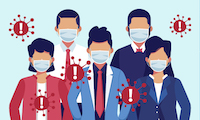TechDispatch #1/2020: Contact Tracing with Mobile Applications
In public health, contact tracing is the process to identify individuals who have been in contact with infected persons. Proximity tracing with smartphone applications and sensors could support contact tracing. It involves processing of sensitive personal data.
What is Contact Tracing?
During epidemics of infectious diseases, such as the Coronavirus disease (COVID-19), it is important to lower the number of new infection cases and to stop it eventually. Therefore the infection chain of onward transmissions must be interrupted. When those persons known to be infected reveal their recent contacts, other infected persons may be identified, informed and e.g. isolated already early on, even before they become aware of their infection. The process to identify contacts of known cases is called contact tracing.
A person becomes a contact of a primary case by e.g. face-to-face contact within a short distance over some time span, physical contact or spending time indoors together–all within the incubation period of e.g. up to 2 weeks for the coronavirus disease.
To establish the risk exposure in contact tracing, information about the distance between the persons and the duration of contact are important. Close contacts with high-risk exposure may then become subject to different rules or treatments.
To read the HTML edition, click the title above.
To read the PDF edition, click the EN button below.
